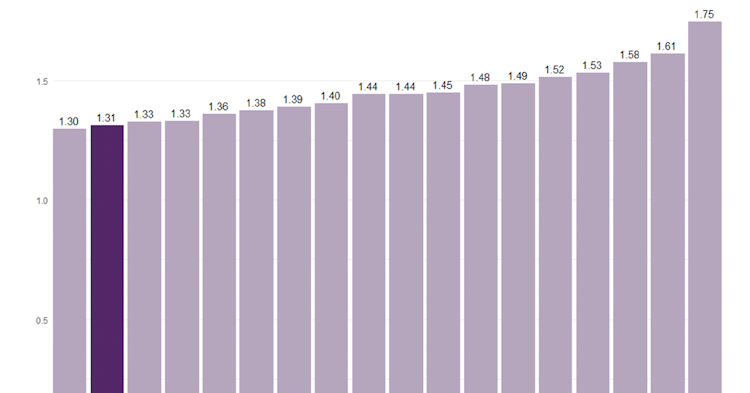‘Under New Management’: Justin Longmuir’s Dockers Boast Some Brilliant Defence
Last updated: Aug 26, 2020, 2:05AM | Published: Aug 26, 2020, 12:14AM
After seven years led by Ross Lyon there’s a new man at the helm of the Fremantle Dockers in Justin Longmuir. Today, in the fifth instalment of ‘Under New Management’, we’ll take a look at the impact he’s had on his club so far in 2020.
As always, we’ll break down the stats over five key areas: how well they’re winning the ball, moving the ball, scoring, defending, and the demographics of the sides they’re putting on the field.
WINNING THE BALL
There are some big changes in Freo’s numbers from 2019 to 2020 when it comes to getting their hands on the ball.
Last season the Dockers averaged a +2.23 clearance differential and a +3.22 ground ball get differential, good enough for fifth and fourth in the league respectively.
Those numbers have both seen a considerable decline under Longmuir in 2020 – the Dockers of this season are going at -4.17 clearances and -4.08 ground ball gets compared to their opponents, ranked 16thand 15th.
That might not make for great reading, but Fremantle’s improvement in the pressure stats - already a reasonably strong area of their game - have been remarkable.
The Dockers have gone from averaging 5.88 pressure acts per minute of opposition possession in 2019 (9th) to 6.19 in 2020, the highest rating of any team in the competition.

They’ve also risen from being ranked 17th for tackles per minute of opposition possession last year to a solid 8th in 2020.
Despite the middling 2019 pressure stats, Fremantle still averaged just 40.9 seconds of opposition possession before creating a turnover – the fifth-best mark in the league that year.
But Longmuir’s 2020 Dockers have taken a big step forward on that impressive number, now forcing the opposition to cough up the ball after 38.2 seconds of possession, the No.1 quickest in the AFL.
RELATED: Understanding how Clearances Shape the Results of AFL Games
MOVING THE BALL
For all their ability to force opposition turnovers in 2019 the Dockers struggled to avoid turnovers of their own – giving up the ball after 38.4 seconds of possession on average, ranked 18thin the AFL.
This is an area they have improved in under Longmuir without necessarily taking a huge leap forward. They’re now holding onto the ball for 40.5 seconds on average before giving it up, ranked 13thso far in 2020.
A key to this has been slower ball movement. In 2019, Fremantle averaged the third highest metres gained per minute of possession in the competition with 116.4. In 2020, they’ve dropped that down to 107.4, ranked 12th.
It has however come at a cost in terms of their ability to produce inside-50s. Lyon’s 2019 Dockers had a so-so -0.6 inside-50 differential (11th), but in 2020, Fremantle have slid much further back, and are -7.33 in inside-50s compared to their opponents (16th).
RELATED: Have the Bulldogs saved their season due to their own rapid ball movement?
SCORING
It won’t come as a shock that Fremantle’s difficulties getting the ball inside-50 aren’t doing much to help them put points on the board. In fact, so far in 2020 Fremantle are scoring only 1.19 points per minute of possession, which is the worst mark of any side in the league.
That’s not ideal, but it’s worth noting that it isn’t necessarily a huge fall from last year, where they scored 1.47 points per minute, and were ranked 16th.
They're only averaging an inside-50 for every 8.26 disposals, which sees them ranked 18th for this stat, the only side recording more than 8 disposals on average per inside-50.
There are some positives, though. The Dockers’ raw accuracy has improved from 44% last year to 47%, and when they do get the ball forward, they seem to be generating better shots on goal.
This year, they’re scoring a goal from 20.4% of inside-50 entries. That’s only good enough for 13th in the competition, but it’s an improvement on last year when they were going at 19.8% (16th).
RELATED: Check out Stats Insider's Shot-Charting Explorer
DEFENDING
While the Dockers’ ability to score has slowed down, they’ve been brilliant at preventing their opponents from doing the same.
This was already a strength – in 2019, they conceded 1.54 points per minute, which was the fifth least of any side in the competition.
But in 2020, as with their pressure and ability to force turnovers, they’ve taken it to a new level. They’re conceding only 1.31 points per minute, which puts them at No.2 in the league.

Longmuir could be especially proud that the only side ranked above his own for that stat in 2020 is Collingwood, where he was the defensive coach for two years before joining the Dockers.
Fremantle are ranked No.1 for the lowest percentage of opposition inside 50s allowed to be goals, at only 17.1% in 2020. This is a noticeable improvement from 21.3% (8th) last year.
They’re also second in the competition for lowest accuracy conceded on goal, with their opponents converting shots only 43.4% of the time, an improvement on last year’s 45.1% (8th).
DEMOGRAPHICS
Demographically, Fremantle are an eerily similar side to what they were in 2019, with their average age and experience close to on par with what it was last year.
Their sides were 24.8 years old on average last year (13th), this year they’re 24.9 (14th). Their average experience has dropped from 1826 to 1735, but they were ranked 15th for this in both years.
Essentially, they were one of the younger and more inexperienced sides in the competition last year, and that still remains the case under Longmuir in 2020.
RELATED: For Young And Old: How Age And Experience Affect AFL Results
CLOSING THOUGHTS
There’s some key differences between Justin Longmuir’s 2020 Dockers and the team that was coached by Ross Lyon last year.
They have taken their ability to apply pressure, force turnovers, and prevent the opposition from scoring to new heights, finding themselves in the top handful of AFL clubs for those areas of the game.
That’s a particularly impressive achievement when you consider how decimated by injury their backline has been this year. First-choice key backs Alex Pearce and Joel Hamling have both missed the entire season, while Griffin Logue has only played five games.
The incredible form of Luke Ryan has been massive for the Dockers, but it’s clear that Longmuir is a wiz when it comes to coaching good defensive footy.
A little bit of love for Luke Ryan (and Coburg).....
— James Rosewarne (@jamesrokewarne) August 25, 2020
#1 in the league for intercept disposals, while the @freodockers are easily the league's grittiest team in defensive-50.
Also comfortably Freo's highest rated player according to our Player Ratings. https://t.co/75vANDSgrD pic.twitter.com/nXmpeQdo5G
The trade-off is that Fremantle are moving the ball slower and typically finding themselves well beaten in the inside 50 count.
They have seen some incremental improvement in their ability to generate quality shots and kick goals when they do get forward however, which is encouraging.
The net result is that in terms of performance, Fremantle are at much the same level they were last year – their 5-7 record so far in 2020 is pretty similar to last year’s 9-13, their percentage has improved a little from 91.9 to 93.5.
There’s been some impressive youth performances, particularly from Caleb Serong, who has the second-most AFLCA votes this year of any Rising Star eligible player.
What will be interesting to see in years to come is whether Longmuir sticks to his defensive game-plan as the side matures, or eventually pushes them to play a more attacking brand of football.
Only time will tell, but for now it’s fair to say that while the club may not have taken big strides up the ladder just yet, Longmuir has been quietly impressive in his first season in charge, especially given the unprecedented circumstances. They'll be a team to monitor closely in years to come.
Note: The stats on points from stoppages/possessions used in this article are recorded as they were published after each game in the Herald Sun.
For a small number of matches these stats were never published, and there is also known to be a small number of typographical errors in the original source data.
Did you enjoy this article? Join our free mailing list to get the best content delivered straight to your inbox, or join the conversation by leaving a comment below or on the Stats Insider Twitter or Facebook page.



